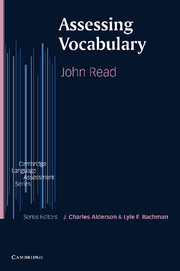Book contents
- Frontmatter
- Contents
- Series editors' preface
- Acknowledgements
- 1 The place of vocabulary in language assessment
- 2 The nature of vocabulary
- 3 Research on vocabulary acquisition and use
- 4 Research on vocabulary assessment
- 5 Vocabulary tests: four case studies
- 6 The design of discrete vocabulary tests
- 7 Comprehensive measures of vocabulary
- 8 Further developments in vocabulary assessment
- References
- Index
2 - The nature of vocabulary
Published online by Cambridge University Press: 03 May 2010
- Frontmatter
- Contents
- Series editors' preface
- Acknowledgements
- 1 The place of vocabulary in language assessment
- 2 The nature of vocabulary
- 3 Research on vocabulary acquisition and use
- 4 Research on vocabulary assessment
- 5 Vocabulary tests: four case studies
- 6 The design of discrete vocabulary tests
- 7 Comprehensive measures of vocabulary
- 8 Further developments in vocabulary assessment
- References
- Index
Summary
Introduction
Before we start to consider how to test vocabulary, it is necessary first to explore the nature of what we want to assess. Our everyday concept of vocabulary is dominated by the dictionary. We tend to think of it as an inventory of individual words, with their associated meanings. This view is shared by many second language learners, who see the task of vocabulary learning as a matter of memorising long lists of L2 words, and their immediate reaction when they encounter an unknown word is to reach for a bilingual dictionary. From this perspective, vocabulary knowledge involves knowing the meanings of words and therefore the purpose of a vocabulary test is to find out whether the learners can match each word with a synonym, a dictionary-type definition or an equivalent word in their own language.
However, when we look more closely at vocabulary in the light of current developments in language teaching and applied linguistics, we find that we have to address a number of questions that have the effect of progressively broadening the scope of what we need to assess.
The first question is: What is a word? This is an issue that is of considerable interest to linguists on a theoretical level, but for testing purposes we have more practical reasons for asking it. For example, it becomes relevant if we want to make an estimate of the size of a learner's vocabulary.
- Type
- Chapter
- Information
- Assessing Vocabulary , pp. 16 - 37Publisher: Cambridge University PressPrint publication year: 2000



